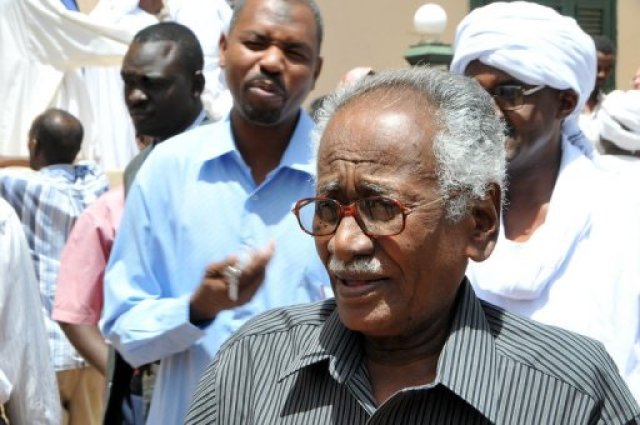
Mohamed Ibrahim Nugud, secretary general of the Sudanese Communist Party (SCP), died on March 22 in London, where he was undergoing medical treatment for an inoperable brain tumour.
Thousands of people joined the funeral procession to farewell Nugud on March 25. His body was taken from the airport past his home and the SCP headquarters before being buried in the Al Farouq cemetery. Leaders of other opposition parties and representatives from South Sudan attended.
During the ceremony, SCP leader Siddiq Yousif said the huge turnout reflected the widespread opposition to the status quo in Sudan.
Condolence statements poured in from around the world for the man who led the SCP for four decades.
Nugud was born in 1930 in Al Qitaina, south of the capital Khartoum. He went to secondary school in Hantoob, where his fellow students included several of today's national political figures.
In 1952, Nugud was kicked out of Khartoum University and jailed for his involvement in the struggle against British colonialism. He went to Egypt, where he linked up with SCP members before travelling to Bulgaria to complete a degree in philosophy.
Nugud returned to Sudan in 1958 as a full-time party activist, immersing himself in the struggle against the General Ibrahim Abboud dictatorship.
After the overthrow of Abboud, Nugud was elected to parliament in 1965. But not long after, he was dismissed along with the other 11 SCP MPs. The SCP was banned as Sudan’s ruling class sought to undermine its strength.
The SCP had developed strong support through its leading role in the anti-colonial movement and the uprising against Abboud.
In 1971, after some SCP members were linked to a failed coup against President Jafaar Nimeiri, then-SCP general secretary Abdel Khaleq Mahjoub and most of the party's leaders were executed in a huge anti-communist purge backed by the West.
During this very dark period of Sudan's history, when many claimed the SCP was finished, Nugud took over as general secretary and led the party's rebuilding.
From 1971 to 1985, Nugud worked underground, skilfully evading the security forces. However, he did not hide from the Sudanese people, who helped and supported him through long years on the run.
Nugud was elected again to parliament in 1986, during one of Sudan's brief periods of democracy.
After President Omer Al Bashir came to power in the 1989 National Islamic Front coup, Nugud was arrested and the SCP was outlawed again, along with all political parties.
In 1990, he was released from jail and put under house arrest. In 1994 he escaped into hiding for the next 11 years.
In 2005, the Comprehensive Peace Agreement was signed, ending the three-decade-long north-south civil war and instituting some limited democratic reforms.
Nugud emerged from underground and gave a series of public lectures to huge crowds. This reflected his deep support among the people, which had enabled him to evade arrest over such a long period.
Nugud was known for his humour and impressive public speaking skills. Each time the national budget was released, people all over Sudan would await Nugud's response.
He wrote many books on a range of topics, including slavery in Sudan, philosophy and the development of the Sudanese state.
On the day of Nugud's passing, the SCP issued a statement noting the crucial contribution made by Nugud to the party and the democratic movement in Sudan.
The statement highlighted his dedication in helping mobilise the masses against the Nimeiri dictatorship: “It was to his credit and dedication that the Party successfully managed to develop and reach its aims in helping to mobilise the masses to oppose the dictatorial regime.
“Under his leadership the Party refused to accept the so-called national agreement in 1976-77. Instead he wrote the brilliant thesis which was adopted by the [central committee] of the Party, 'For a broad Front to achieve democracy and safeguard the homeland'. The document was the basis to help to regroup the opposition masses and finally to topple the military regime.”
The statement concluded: "Comrade Nugud was not only a Party leader, but a fighter and a thinker of a rare calibre."
Nugud had the ability to relate to anyone, helping overcome the religious and ethnic conflicts that have divided the Sudanese people.
He was widely popular and deeply respected for his unfailing commitment to the struggle of the Sudanese people. Nugud's memory, and his example as a true people's hero, will live on.